OLYMPICS AND JAPAN
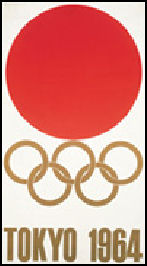
Japan participated in its first Olympics in Stockholm in 1912 and has competed in every Olympics after that except in 1948 — after World War II — when it was not invited and 1980, when it participated in the American-led boycott against Moscow.
Japan hosted the Summer Olympics Tokyo in 1964, the Winter Olympics in Sapporo in 1972 and the Winter Olympic at Nagano in 1998. Osaka failed in its bid to host the Summer Games in 2008. Nagoya lost its bid for the summer games in 1988 and Tokyo lost its bid to host the 2016 Olympics. In June 2011, Tokyo announced its intention to host the 2020 Olympics, with some events being held in areas devastated by the earthquake and tsunami in 2011.
Tokyo originally won the rights to host the Olympics of 1940, but with a number of countries threatening to boycott and the Japanese government worrying it would distract the military, the games were moved to Helsinki and then canceled outright with the outbreak of World War II. Japan was welcomed back to the Olympics in 1952.
Olympic sports that Japan is good at include judo, marathon running, baseball, wrestling, women's field hockey, men's gymnastics, women’s softball, speed skating, and ski jumping. It does okay in swimming and used to be strong in women's volleyball. In early Olympics Japan won most of its medals in swimming. In the 1960s and 70s it won the lionshare of its medals in wrestling, men's gymnastics and judo. In recent years the majority of its medals have been in judo.
Local sports clubs and private companies are stepping up their efforts to groom young athletes for national and international competitions as a way of bringing attention to their localities.The Japan Sports Association and the Japanese Olympic Committee were founded in 1911 with Jigoro Kano, the "father of judo," as its first president. The association became the Japan Sports Association after World War II, and the JOC separated from the association to become an independent entity in 1989.
Doping generally is not a big problem with Japanese athletes but it does happen. Greco-Roman wrestler Katsuya Kitamura was banned for two years from his sport in June 2011 for a doping violation . Kitamura was a three-time national champion in the 96-kilogram weigh class.
The IOC awarded Japanese broadcast rights to the 2014 and 2016 Olympics for $462 million to a consortium of broadcasters, including NHK.
Links in this Website: SPORTS IN JAPAN (Click Sports, Recreation, Pets ) Factsanddetails.com/Japan ; OLYMPICS AND JAPAN Factsanddetails.com/Japan ; JAPANESE OLYMPIC ATHLETES Factsanddetails.com/Japan ; JAPANESE MARATHON RUNNERS AND TRACK ATHLETES Factsanddetails.com/Japan ; JAPANESE OLYMPIC SWIMMERS Factsanddetails.com/Japan ; JAPANESE OLYMPIC GYMNASTS AND WRESTLERS Factsanddetails.com/Japan ; JUDO, JAPAN AND THE OLYMPICS Factsanddetails.com/Japan ; WINTER OLYMPICS AND JAPANESE ATHLETES Factsanddetails.com/Japan ; JAPANESE FIGURE SKATERS Factsanddetails.com/Japan
Good Websites and Sources: Wikipedia article on Japan at the Olympics Wikipedia ; Medal Winners in Olympics.org olympic.org/en ; Japanese Olympic Committee joc.or.jp/english ; Essay on Japan’s Rebirth at the 1964 Olympics aboutjapan.japansociety.org ; Database on Olympic Athletes databaseolympics.com
Japan won its most gold medals (16) in Athens in 2004 and when it hosted the 1964 Tokyo Olympics. Japan ended the 2008 Beijing games with only nine golds and only seven at London in 2012 even though its total medal haul were records (36 in Beijing and 37 in London).
Olympic Performances by Japan
As the 2000 in the Summer Olympics, Japan had won 27 gold medals in gymnastics, 23 in judo, 20 in wrestling, 15 in swimming, 5 in track and field, 3 in volleyball, 2 in weightlifting, 1 in boxing, 1 in shooting and 1 equestrian sports. It has won a total of 98 gold medals, 97 silver medals, and 105 bronze medals.
Year-- Host City — -- Gold- Silver- Bronze- Total 1920-- Antwerp — — 0 — -- 2 — -- 0 — — 2 1924-- Paris — -- EXTENDED BODY:
— — — - 0 — -- 0 — -- 1 — — 1 1928-- Amsterdam — 2 — — 2 — — 1 — -- 5 1932-- Los Angeles — 7 — -- 7 — -- 4 — -- 18 1936-- Berlin — -- EXTENDED BODY:
— — — - 6 — -- 4 — - 10 — - 20 1952-- Helsinki — — - 1 — -- 6 — -- 2 — -- 9 1956-- Melbourne — -- 4 — -- 10 — - 5 — -- 19 1960-- Rome — -- EXTENDED BODY:
— — — - 4 — -- 7 — -- 7 — -- 18 1964-- Tokyo — -- EXTENDED BODY:
— — — 16 — - 5 — -- 8 — -- 29 1968-- Mexico City — - 11 — -7 — -- 7 — -- 25 1972-- Munich — -- EXTENDED BODY:
— — — 13 — - 8 — -- 8 — -- 29 1976-- Montreal — — - 9 — -- 6 — -- 10 — 25 1984-- Los Angeles — 10 — --8 — -- 14 — - 32 1988-- Seoul — -- EXTENDED BODY:
— — — - 4 — --3 — — 7 — -- 14 1992-- Barcelona — — 3 — -- 8 — -- 11 — - 22 1996-- Atlanta — -- EXTENDED BODY:
— — — 3 — -- 6 — — 5 — - 14 2000-- Sydney — -- EXTENDED BODY:
— — — 5 — -- 8 — — 5 — - 18 2004-- Athens — -- EXTENDED BODY:
— — — 16 — -- 9 — - 12 — - 37 2008-- Beijing — -- EXTENDED BODY:
— — — - 9 — — 6 — - 10 — 25
In the Asian Games in 2006 Japan won 198 medals (50 gold medals, 71 silvers and 77 bronzes). It finished third in total medals behind China and South Korea.
Japanese Olympic Athletes
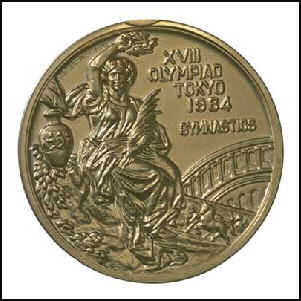
1964 gold medal Good Japanese athletes are under a lot of pressure to do well to boost the country's moral. Those who are expected to win a medal but don't are regarded a disappointment and led to believe they have let down the entire nation. Off course other nations put similar pressure on their athletes but in Japan it seems particularly intense. A marathon runner who won a bronze medal in the marathon at Tokyo in 1964 later committed suicide because he blew a chance to win a silver medal.
Mitsuo Tsukahara, a gymnast who won Olympic gold medals in 1972, told the New York Times, "When I won my medals I was happy, of course. But before I won them, I always felt like I was under a lot of pressure to win, like people were pushing too hard."
Athletes that win a gold medal receive up to $70,000 from the Japan Olympic Committee. The top eight finishers received cash prizes ranging from $30,000 for a silver medal and $20,000 for a bronze medal to $4,000 for eighth place. Winning relay teams split $80,000 and a $100,000 is given for world records A total of $7.194 million prize money was given out in connection with the 2004 Olympics.

Athletes are often selected for world class events by committees in their sports that are often run by old men who have never even done the sport. In some cases if an athletes is successful and earns money from sponsorships and endorsements much of the money goes to the and the Japan Olympic Committee not the athlete. In other cases athletes who win national competitions are skipped over for Olympic berths by the committee in favor of popular athletes.
Olympics sport committees kept one swimmer from going to the Olympics in 2000 because she trained in the United States. A tae kwon do athlete almost couldn’t go because the national are kwon do organization split in two.
Japanese Olympics Training and Technology
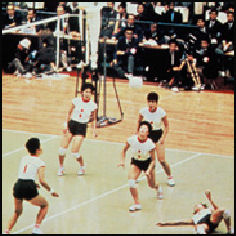
64 women's volleyball team
known for hard training Many Olympic athletes are dependent on corporate sponsorship to free them from financial worries so they can put in the training that is necessary to reach a world class level. Economic troubles in Japan however have led to decline in the amount of money available to athletes.
Some athletes train in special low-oxygen tent at Tokyo University that is intended to simulate the conditions of training at 2,000 to 3,000 meters above sea-level. The 30-meter-long, nylon tent covers a track and has a machine that reduces the oxygen concentrations in the air from 21 percent to 14 percent. Athletes that jog lightly for 10 to 20 minutes feel as if they have had a hard workout.
Discipline and dress codes are enforced by Japan’s sport organizations. The Japan Swimming Federation prohibits its swimmers from dying their hair and wearing garish nail polish. Alcohol is banned at their training camp. Snowboarder Kazuhiro Kokubo was barred from attending the Opening Ceremonies by Japan’s Olympics delegation because he wore his uniform in a way that was seemed inappropriate. On the plane trip to Vancouver he wore his official team trousers below the waist with his shirt untucked and his tie loosened.
Craftsmen in Japan have supplied Olympic athletes with sports equipment such as ping pong paddles and weights. Mashisa Tsujitani produces the world’s best shots for shot putting from his workshop in his house in Fujima in Saitama Prefectures. With lathes and power tools he produced about 100 shots a week. He produced shotputs for the medal winners in Olympics and World Championships. At the 1996 Olympics in Atlanta all 12 finalists used his special grooved shots that are carefully balanced and come with a variety of grips. They cost about $50 wholesale ($150 retail) with about a third of the costs going for materials. After the Olympics in Sydney in 2000 he was offered $20,000 a week to make shots for a major sporting goods manufacturer but turned down the deal.
Many of the whistles used at Olympics in Athens in 2004, Sydney 200, Nagano in 1998 and Salt Lake City in 2002 and the World Cups in 1982, 1986 and 2002 were made by Noda Kakuseisha Mfg Co. in Tokyo. The president of the company, Kazuhiro Noda, told the Daily Yomiuri. “We’ve always been competing with foreign whistle makers, but the quality of their whistles dies not compare. The company also supplies whistles to NATO, the German Bundesliga and the French national police. The quality and extraordinary loudness of whistle are attributed to smooth spinning of the cork ball inside the whistle. Soccer referees have said they like the whistles they allow them to convey a wide range of emotions.
See LZR Swimsuit, Swimming
Olympics and Japanese Companies
The Mizuno Corporation supplies baseball, softball and judo equipment and is even a member of the Japan Olympic Committee. The company drew some attention at the Sydney Olympics with its Fastskin swimsuit, whose design was modeled after sharkskin.
See LZR, Swimming
After Mizuki Noguchi crossed the finish line and won the women’s marathon at the 2004 Olympics in Athens she took off her right shoe and kissed its as an expression of gratitude to the shoemaker Asics and its shoe designer Hitoshi Mimura, who developed a special shoe for Noguchi and the course she ran that weighed only 118 grams and ad rice husks in the soles to provide better traction. Mimura flew to Athens to examine the course himself to best design the shoe.
Mimura also designed the shoes that Naoko Takahashi wore when she won the gold medal at Sydney in 2000. The sole of right shoe was slightly thicker than the sole of her left shoe to compensate for the fact that her right leg is eight millimeters shorter than her right one.
History of Japan and the Olympics
Under the urging of Kano Jigoro, a “judo “athlete, the Japanese Olympic Committee was established in 1911. Two athletes were sent to participate at the Fifth Olympiad in Stockholm the following year. The first two Japanese to participate as members of a Japanese team were Mishima Yahiko, a sprinter, and Kanaguri Shiro, a long-distance runner. Though the next games were to be held in 1916, they were canceled due to World War I. [Source: Web-Japan, Ministry of Foreign Affairs, Japan]
“By the 1920 Games at Antwerp, Japan fielded a team of 15 and earned its first awards: a pair of silver medals in singles and doubles tennis. At the 1928 Games in Amsterdam, Japan took its first two gold medals, in track and field and swimming. Athlete Hitomi Kinue became the first woman to join a Japanese Olympic contingent. She received a silver medal in the 800-meter running event, and her success encouraged more women to take up competitive sports. A contingent of 131 members represented Japan at the 1932 Games in Los Angeles, including 16 women. Japanese athletes earned a total of 7 gold, 7 silver, and 4 bronze medals in track and field, swimming, equestrian events, and field hockey.
“At the 1936 Games in Berlin, Japan fielded one of the largest teams in its history: 179 athletes, including 17 women. The events were broadcast live via a Nippon Hoso Kyokai (NHK; Japan Broadcasting Corporation) radio linkup, and enthusiastic fans tuned into their radio sets late into the night (because of the time difference between Japan and Europe) to listen to the athletes’ progress. At Berlin, swimmer Maehata Hideko became the first Japanese woman to take a gold medal in Olympic competition by winning the 200- meter breaststroke event.
“In February 1936, the International Olympic Committee (IOC) designated Tokyo and Sapporo as the venues for the Summer and Winter Games, respectively, to be held in 1940. However, the Tokyo Olympic Games were canceled because of World War II; the London Olympic Games to be held in 1944 were also suspended for the same reason, being realized at last in 1948. Japan was not invited to participate in the 1948 Games in London, but was readmitted to the International Olympic Committee in 1951, and sent a team of 72 athletes to the 1952 Games in Helsinki. A team of 100 men and 16 women traveled to Melbourne in 1956, and won a total of 19 medals, including 4 golds. In 1960, Japan organized a large team of 147 men and 20 women to take part in the Rome Olympics. At the closing ceremonies, athletes from the 84 participating countries were reminded that in four years’ time, they would be meeting again in Tokyo.
Summer Games at Tokyo in 1964
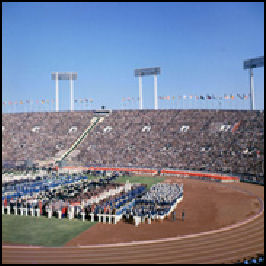
1964 Opening Ceremonies The 1964 Summer Olympics in Tokyo were the first Olympics in Asia. A total of 4,473 male athletes and 678 females athletes from 92 country competed it 163 events in 21 sports, The sports of judo and volleyball were added to meet local demand with Japan winning six medals in the sports. Sixteen national contingents, mainly from developing countries, participated in the Olympics for the first time.
In 1952, the postwar military occupation of Japan came to an end, and Japan made a bid to the IOC for Tokyo to host the Seventeenth Olympiad, to be held in 1960. The bid was won by Rome, but Japan was not discouraged. In October 1955, the Tokyo Metropolitan Legislature approved a decision to bid on hosting the Eighteenth Olympiad, to be held in 1964. A Japanese delegation visited Munich, Germany, for the fifty-fifth meeting of the IOC. Japan had set its hopes on winning the right to host the games and waged an aggressive campaign to wrest votes from rivals Detroit and Vienna. Finally on March 26, 1960, the IOC delegates put the matter to a vote. [Source: Web-Japan, Ministry of Foreign Affairs, Japan]
The 1964 Summer Games were regarded as a turning point for Japan in its transformation from a defeated nation after World War II into a major economic power of the late 20th century. High school history books record the 1964 Olympics as an important historical event. It signified the end of the postwar reconstruction period and underscored Japan’s high economic growth. During the five years leading up to 1964, preparations for the games literally transformed the face of Tokyo. Roads in the city and suburbs were widened. A huge Olympic Village sprang up in Yoyogi, and NHK built a new broadcast center nearby to cover the event. Total expenditures in preparation for the event were said to be the highest in Olympic history. But perhaps the greatest showpiece project associated with the Olympics was the Shinkansen bullet train — billed as the world’s fastest — which began service between Tokyo and Osaka on October 1, nine days prior to the start of the games.
As host nation, Japan sent the largest team it had ever organized: 296 men and 61 women. Urged on by rousing cheers from their compatriots, Japanese athletes took medals in boxing, gymnastics, wrestling, track and field, weightlifting, and shooting. One of the most emotional events of the games was in women’s volleyball, where the Japanese team won a hard-fought victory over the Soviet Union to take the gold medal. Also at the Tokyo Games, a native Japanese sport — “judo” — was included as an Olympic event (men only) for the first time. Japanese athletes took gold medals in all weight classes except the unlimited division, which went to the Netherlands. The Tokyo Games saw the establishing of 47 new world records and 111 Olympic records. The 16 gold, 5 silver, and 8 bronze medals earned by the Japanese team marked its best Olympic performance in history, placing Japan third in the overall medal standings behind the United States and the Soviet Union.
The opening ceremony on October 10 recorded an 87.4 percent television viewer rating in Japan. Tokyo major Ryotari Azuma said, "Without the Olympics Japan would not have risen to its high position in world trade so fast. Our national prestige depended on the Tokyo Games. It was also a big boost for the electronic industry. The number of televisions rose from two million to 16 million, partly because it was so difficult for local people to get tickets.
One of the biggest shocks at the 1964 Tokyo Olympics was when the 1.98-meter, 120-kilogram Dutch giant Anton Geesink won the gold medal in open class men’s judo event, pinning Japanese rival Akio Kaminaga in the final much to the dismay of the 15,000 watching at the Nippon Budokan. Japan had won the three other weight-class gold medals but considered the open class title the most prestigious. The torch bearer in 1964, Yoshinori Sakai, was from Hiroshima and was born on August 6, 1945, the day the atomic bomb exploded there and he just missed participating in the Olympics in the 400-meter run.
Summer Games in 1996 and 2000 and Japan
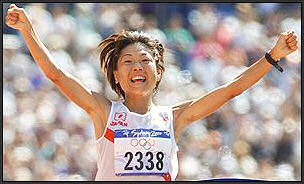
Naoko Takahashi
marathon gold
medalist in 2000l At the 1996 Summer Olympics in Atlanta Japan ranked 23rd in total medals. Japanese athletes won 3 gold medals, 6 silver medals, and 5 bronze medals for a total of 14 medals. Japan won two of its gold medals in judo, a sport invented in Japan. Japanese athletes who won a gold medal got a cash award of around $30,000 from the government. Many were disappointed by the performance. "Even the North Koreans won two gold medals," one Japanese newsman told TIME. "And North Koreans don't even eat rice."
At the 2000 Summer Olympics in Sydney, Japan ranked 15th in gold medals and 14th in total medals. Japanese athletes won 5 gold medals, 8 silver medals, and 5 bronze medals for a total of 18 medal, including four out of 14 gold medals in judo and two silvers and two bronzes in judo. Japanese swimmers won two silver medals and two bronze medals in swimming and silver medals in duet and team synchronized swimming.
Summer Games in Athens in 2004 and Japan
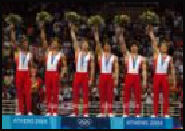
men's gynmastics team
gold medalist in 2004 At the 2004 Summer Olympics in Athens, Japan did very well. It ranked fifth in gold medals behind the United States, China , Russia and Australia and 6th in total medals. Japanese athletes won 16 gold medals, nine silver medals, and 12 bronze medals for a total of 37 medals, a record for Japan and 19 more than they earned in 2000.
Japanese athletes won eight out of 16 gold medals and two silvers in judo. Japanese swimmers won three gold medals and one silver medal and took silvers in duet and team synchronized swimming. Mizuki Noguchi won the women’s marathon and Koji Murofushi won the in the hammer throw.
Japan 16 gold medals tied the country’s record, equaling what it won in Tokyo as the host in 1964 and was triple the number it won in Sydney in 2000 and was more than what it had won in its last four summer Olympics combined. Japan’s overall medal count of 37 was a Japanese record, surpassing the 32 that they won in boycott-tarnished Los Angeles in 1984. The good results were credited in part to high-tech training methods worked out a new sports science institute.
Summer Games in Beijing in 2008 and Japan
Japan placed 8th in gold medals and 10th in total medals at the Beijing Olympics in 2008 with 25 medals — 9 gold medals, 6 silver medals and 10 bronze medals — behind China and South Korea in Asia. A total of 339 Japanese athletes participated n the Games, the second largest contingent since the Tokyo Olympics in 1964. Japan’s performance was a little disappointing. Some had hoped that Japan wold win more than 30 medals and take home more double digit golds.
During the torch relay in Nagano, after the uprising in Tibet, Japan Chinese students clashed with pro-Tibetan activists. Some of the clashes resulted in bloodied noses and scrapes, which the Chinese students played up before cameras. Buses that took the students to Nagano were organized and paid for in part by the Chinese government. The original starting point of the torch relay, Zenkoji temple, was withdrawn from the relay. The safety of worshipers and the inconvenience caused them was sited as the primary reason for the decision but concerns over the situation in Tibet were also cited. A spokesman for the temple said, “As a place of Buddhism and religion, we took into account [China’s] human rights violations against Tibet.”
The oldest person to compete in the Olympics in Beijing in 2008 was Hiroshi Hoketsu, a 67-year-old equestrian rider who took part in the Olympics before — in Tokyo in 1964. In 1964 he competed in the show jumping event, placing 40th. In 2008, he competed in team dressage. A retired health-care executive, Hoketsu has a graduate degree from Duke and spent much of his career in Germany. He switched to less demanding dressage when he was in his 30s and made the Olympic team in 1988 but didn’t compete because of quarantine problems with his horse. To prepare for Beijing he woke up every morning at 5:00am to train.
Other noteworthy Olympians in 2008 included 30-year-old Takashi Miyazawa, competing in the men’s road bicycle race eight years after donated part of his liver for a transplant for his mother; soccer player Tadanari Lee, a Korean citizen unable to gain Japanese citizenship even though though his family had lived in Japan for four generations; and Chisato Fukushima, the first Japanese woman to qualify for the 100 meter dash since 1952.
Athletes from 20 nations, including Poland, Italy, France, Germany, Spain, New Zealand, Slovakia, Belgium, Brazil and Tunisia trained in Japan before th 2008 Olympics in Beijing over worries about the pollution and food in China.
World Track and Field Championships in Japan
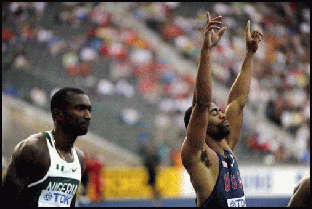
Tyson Gay at Osaka in 2007 Tokyo hosted the 1991 World Track and Field Championships. The most memorable event there was Mike Powell leaping 8.95 meters to break Bob Beamon’s 1968 world record in the long jump. Carl Lewis set a world record in the 100 meters with a time of 9.86. Leroy Burrel finished second in 9.88, also bettering the previous world record. For Japan, Hiromi Taniguchi won the men’s marathon to become Japan’s first world champion. Sachiko Yamashita finished second in the women’s marathon.
The 2007 World Track and Field Championships was held in Osaka. A record 1,978 athletes from 203 countries competed in the nine-day event. The Emperor and Empress showed up for the opening ceremonies. The event was largely heralded as a success despite the heat and humidity which particularly took a toll on the marathon runners and other endurance athletes. Despite mist showers and a many water stops 30 percent of the runners dropped before the midday point in the men’s marathon in temperatures that rose above 30 degrees C before 8:00am.
The stars of the meet were Americans Tyson Gay and Allyson Felix, who joined the short list of athletes who won three golds in one meet. Gay who won gold in the 100 metes, 200 meters and 4-x-100 meters relay. Michael Wariner who won gold in the 400 meters and 4-x-400 meters relay. It looked as if Japan might not win any medals. Night and after night Japan failed to win a medal. Many stars didn’t even makes it the finals. Finally on the last day Reiko Tosa won a bronze in the women’s marathon.
At the 2007 World Track and Field championship in Osaka American sprinters
Japan in the 2011 Asian Games
Japan sent 680 athletes to the Asian Games in Guangzhou in November 2010. It finished third in medals with 48 gold medals and 216 total medals, compared to 76 gold medals and 232 total medals for South Korea and 199 gold medals and 416 total medals for China.
Some Japanese found the results humiliating. The one gold medal and two bronzes won by the women’s wrestling team was considered such a disgrace that the team was not allowed to take a break and had to go right back to training after the competition was over, The head of the Japan Wrestling Association said: “They’ll practice tomorrow. And right again after we get back to Japan If you say something lame like you want to take a break, you won’t win the next time either.”
Future Olympics
After was perceived as poor performances by Japanese athletes in the Olympics in 2008 and other international competition the Japanese government’s Education, Science and Technology Ministry established a government-sponsored system — the Japan Restoration Project — to improves performances in the future with the aim of winning more medals in Vancouver in 2010 and London in 2012. The project will utilize psychologists, psychiatrists, nutritionists, doctors, trainers, information gatherers, scientists and engineers as well as coaches as modeled after a similar program conducted Australia.
Tokyo, Madrid, Chicago, Prague, Rio de Janeiro, Baku in Azerbaijan and Doha in Qatar have all applied to host the 2016 Olympics. Tokyo Mayor Shintaro Ishihara is putting a lot of energy into trying the games for Tokyo. Tokyo residents are not as enthusiastic. One poll showed only 25 percent of Tokyo residents supported the city government’s plan to win them.
Tokyo is spending $46 million in its effort to secure the 2016 Olympics. It said it will spend $6 billion, half for construction of new venues and half for operations. This is regarded as a vast underestimate. Security costs alone are estimated to be $3 billion. One plan calls for spending ¥1 trillion to redevelop the 1964 Olympic site at Yoyogi for the 2016 event.
Tokyo, Madrid, Chicago and Rio de Janeiro were selected as the four finalists to host the 2016 Olympics. Tokyo has earned high marks for security, safety, infrastructure and accommodation available. It has come up short in the areas of government support, legal issues and public opinion. Domestic support for the Olympics was measured at 59 percent, lowest among the four finalists, and the ratings for spectator turnout at previous major sporting events was low.
Tokyo’s Bid for the 2016 Olympics
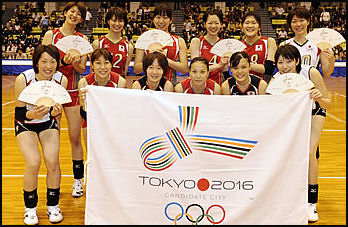
promoting Tokyo's 2016 bid Tokyo’s bid for the 2016 Olympics was presented in the form of a thick, 538-page three-volume file separated into 17 themes ranging from environmental impact to marketing and doping controls. The Tokyo organizing committee promised it would host a reasonably priced, compact and environmentally-friendly games. The budget for the games is $4 billion. The projected economic impact os said to be $30 billion.
Tokyo promise for a compact games with includes a proposal for 95 percent of venues to be within an eight-kilometer radius, and for the Athletes Village to be only two kilometers from the Olympic stadium. Twenty-three of the 34 venues already exist, including many facilities built for 1964, each with a sustainable post-Games business plan. The Tokyo organizing committee said that many tickets would be priced under $50 and plans to solar panels would be installed on the roof of the main Olympic stadium and trees would be planted around the venues..
Tokyo has been given high marks in all categories but one: public support. An IOC survey in February 2009 found that support for Tokyo’s 2016 bid was only 56 percent. Bid officials have raised questions about this number and conducted their own survey, coming up with support between 70 percent and 81 percent.
An IOC delegation of inspectors came to check out Tokyo in April 2009. They were greeted by a former and current Olympians and by 5000 school kids who were told they were going on a field trip and coincidently ran into the IOC members. The delegation toured 24 of 29 venues. In some cases they visited empty lots and put on high-tech glasses that gave then a 3-D virtual reality tour of what the unbuilt facilities would look like when they were completed. Organizers heaved a sigh of relief as the bus-transported delegation made it from the airport to their hotel and traveled around Tokyo without encountering any major traffic jams. They were not happy though about small demonstration over the cost to taxpayers of the games.
Tokyo Loses Bid for the 2016 Olympics
Tokyo failed in bids to host the 2016 Olympics. Rio de Janeiro was the winner. The Tokyo city government was left with a large deficit.
Tokyo spent $150 million on the bid. Japanese Prime Minister Yukio Hatoyama flew to Copenhagen, where the host was chosen, to give a final speech to persuade IOC members to vote for Tokyo. Ishihara said he was disappointed by the result but wouldn’t quit. He was widely criticized for saying there were “invisible dynamics” behind Rio’s victory and that Brazilian President Luiz Inacio Lula “made quite daring promises to people from Africa.” Ishihari said, “Our presentation was far better than those of other countries but it didn’t earn us points. I realized that again there was a sort of invisible dynamics at play.”
Madrid, Rio de Janeiro, Chicago and Tokyo were the four finalists. Chicago was eliminated in the first round, Tokyo went out next, with Rio de Janeiro ultimately winning out because it was the second choice among those who supported Chicago and Tokyo.
One factor why Tokyo didn’t win was a lack of support. According to a an IOC survey only 55.5 percent of Tokyoites supported the bid compared to 84.9 percent in Madrid and 84.5 percent in Rio.
In October 2009, Hiroshima and Nagasaki announced that they would jointly bid to host the 2020 Summer Olympics. A month later Tokyo said it also wants to also bid to host the 2020 games. In June 2011, Tokyo officially announced its intention to host the 2020 Olympics, with some events being held in areas devastated by the earthquake and tsunami in 2011. In July 2011, Tokyo officially submitted its bid to host the 2020 Olympics.
Tokyo’s 2020 Olympic Games Bid
Tokyo is one of the contenders to host the 2020 Summer Olympics. Support among residents for hosting the 2020 Olympics in Tokyo was 67 percent in October 2012, after a strong Japanese performance in the 2012 London games, up from 47 percent in May when an international Olympics Committee survey when rivals Istanbul and Madrid posted approval ratings of when , against 73 and 78 percent respectively. IOC will pick either Tokyo, Madrid or Istanbul to host the 2020 Games. Rome, Istanbul, Doha and Baku had also made bids but they dropped out (Rome) were eliminated in the first round. The host city will be chosen at the IOC Session in Buenos Aires in September 2013.
In May 2012, when the IOC eliminated Doha and Baku from the running, Bloomberg reported: “The IOC “working group concluded that Tokyo “presents a very strong application and offers athletes the conditions to be able to compete at their best.” Tokyo has put aside about 400 billion yen ($5 billion) to ensure enough funding for the Summer Games and would build 20 new venues for the Olympics. Japan, which built the Tokyo-Osaka bullet train for the opening of the 1964 Games, would place 28 out of 31 competition sites within 8 kilometers (5 miles) of the Olympic Village to ensure ease of travel. “We have kept the best and improved the rest from our previous bid,” Tokyo 2020 bid president Tsunekazu Takeda said in a statement. [Source: Dan Baynes and Chris Cooper, Bloomberg, May 23, 2012]
Ken Marantz wrote in the Daily Yomiuri, “It might be stretching the legacy angle a bit, but the centerpiece of Tokyo's bid for the 2020 Olympic Games would certainly share common ground with its 1964 edition. A rebuilt National Stadium, the main venue for the Tokyo Olympics nearly a half-century ago, has been included as part of the bid plan unveiled by the Tokyo 2020 Bid Committee. "This is a treasure," bid committee CEO Masato Mizuno said of the future stadium with an 80,000-seat capacity. [Source: Ken Marantz, Daily Yomiuri, February 17, 2012]
"The location of the main stadium would really be in the center of Tokyo...There are so many stations around there, so people can travel much easier,” Mizuno said. The stadium location, and the subsequent shift of the proposed Athletes Village to a more central spot, are the main changes--or "improvements," as one bid committee official put it--from the city's failed bid for the 2016 Olympics, which went to Rio de Janeiro.
As with the 2016 bid, the 2020 effort will emphasize a compact, environmentally friendly Games, with most venues within an 8-kilometer radius of the Athletes Village. It presents its case with a bid budget of 75 billion yen ($950 million), half the amount previously spent. The bid also promotes using the Games as a vehicle for Japan's recovery from the March 11 disaster, with former World Cup venue Miyagi Stadium added as a soccer venue to directly bring the Olympics to the hard-hit Tohoku region.
The 2020 bid plan calls for the Athletes Village, which would have been in the Ariake waterfront area in 2016, to be moved north to Harumi, the site where a new main stadium had been proposed. Mizuno said the bid committee had considered the risk of putting the Athletes Village, as well as other venues, on land reclaimed from Tokyo Bay, in lieu of recent predictions of a possible major earthquake hitting the Kanto region.
While several venues will be built from scratch, Tokyo will again appeal to the IOC's desire for an Olympic legacy by using Yoyogi Gym, built for the 1964 Olympics, as a venue. The rebuilding of National Stadium became necessary because it did not meet Olympic standards. Mizuno said there will be some reminder of the arena's great history.
Tokyo Plans to Host 'Compact Games'
In December 2012, The Yomiuri Shimbun reported: “The 2020 Summer Olympics in Tokyo would become a "compact Games" with competition venues and 87,000 hotel rooms for visitors concentrated within a 10-kilometer radius in a central location, according to a master plan to be submitted by its bidding committee. As bidders are allowed to start their promotional campaigns overseas early next month, the Japan Olympic Committee will dispatch executives to Europe for an extended period to gain an edge against its rivals. [Source: Yomiuri Shimbun. December 31, 2012]
A master plan is compiled by each bidding city to outline its plan to host the Games. Tokyo's plan states that its basic approach is to concentrate 85 percent of the competition venues within an eight-kilometer radius from the athletes' village, to be built in the Harumi waterfront district of Chuo Ward. The marathon course is set to start at the New National Stadium, passing by such sites as Tokyo Dome and the Imperial Palace and extending all the way to Asakusa before concluding at the stadium.
The plan emphasizes Tokyo's state-of-the-art public transportation system, which it says can "carry 25.7 million passengers a day." Under the plans, sections of the Metropolitan Expressway and other main roads totaling about 320 kilometers would be designated as "Olympic lanes" for exclusive use by athletes and Games officials. More than 140,000 hotel rooms would be made available within a 50-kilometer radius from the athletes' village, according to the plan. It says the Tokyo Games will make the best possible use of eco-friendly technologies such as solar panels and low-emission vehicles.
Image Sources: Japan Olympic Committee, Olympic.org
Text Sources: New York Times, Washington Post, Los Angeles Times, Daily Yomiuri, Times of London, Japan National Tourist Organization (JNTO), National Geographic, The New Yorker, Time, Newsweek, Reuters, AP, Lonely Planet Guides, Compton’s Encyclopedia and various books and other publications.
Last updated January 2013
